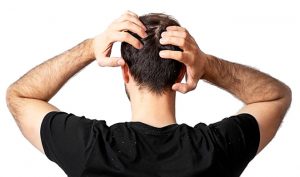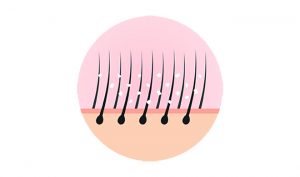Dandruff is one of the most common scalp disorders that affects everyone but usually occurs in pre-pubertal age. Dandruff appears as white flakes on the scalp and it can cause dryness and itching. Dandruff is also found on other parts of the body like eyebrows, beard, moustache, chest and shoulders. Although poor hygiene is believed to be the primary cause, dandruff can also be a symptom of various medical disorders.
Types of Dandruff
Scalp shedding results from the division and eventual death of skin cells through their life cycle. However, people with dandruff have a faster skin cell cycle. Therefore, more dead cells accumulate on their scalp, causing itchiness and dryness. Also, dead cells fall off more frequently.
- Fungus-Related Dandruff : Yeast or dandruff fungus is a common cause of this condition. Malassezia is the fungus that causes dandruff.
- Dry Skin-Related Dandruff : Skin dehydration is a primary cause for dandruff. It mainly occurs in winter due to dry and cold weather. Taking a hot shower can also cause it to occur. Hot water can dry out the scalp, causing it to become flaky.

- Oil-Related Dandruff : Dandruff is also caused by accumulation of sebum on the scalp. Overproduction of sebum by hair follicles, causes dead skin cells to build up on the scalp. When dead skin cells stick together, they form yellowish, oily, itchy flakes.
- Disease-Related Dandruff : Skin flaking can result from several skin problems. For example, seborrheic dermatitis may cause severe dandruff. This condition causes severe itching, redness, scaly patches and swelling of the scalp. Seborrheic dermatitis has visible inflammation symptoms, but dandruff causes mild red skin. This disease is more common in people with oily skin, especially in areas with sebaceous glands. Other skin conditions that can cause dandruff include Psoriasis and Eczema.
The skin diseases that cause dandruff can be diagnosed and treated by a dermatologist or a professional healthcare provider. However, knowing how dandruff develops can help you identify your type and its most effective treatment.
Can dandruff be prevented?
- Consume a healthy diet : Probiotics in curd, yoghurt and fermented foods and omega-3 fats found in flaxseeds, fish and walnuts can help keep the scalp moisturized. Consumption of Biotin (Vitamin B7) rich foods such as egg yolk, sweet potatoes, legumes, and mushrooms can also help reduce dandruff.
- Manage stress : Studies show that stress can trigger or worsen various skin conditions, such as psoriasis and eczema, which can lead to dandruff

- Prevent hair damage : By using less hair-styling products, as they can accumulate on the scalp and cause greasy hair.
- Practice hair care : People with oily hair should wash them regularly to prevent dandruff. Gently massage the hair and scalp to loosen the flakes, then rinse thoroughly. People with dry and sensitive scalp should shampoo them less frequently and condition them often.
Generally, dandruff can be managed at home with the help of anti-dandruff shampoos. These shampoos contain different ingredients that target specific problems. Some of these ingredients include:
- Zinc pyrithione : It is an antibacterial and antifungal agent that helps treat fungal infections.
- Salicylic acid : It helps reduce dandruff and flaking.
- Selenium sulfide : It helps in treating fungal infections of the scalp.
- Ketoconazole : It is an antifungal agent that helps in reducing flaking, scaling, and itching.
- Coal tar: It reduces inflammation, scaling and itching.
If an individual experiences any allergic reactions to anti-dandruff shampoos, they should consult a dermatologist.
